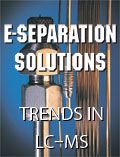The LCGC Blog: What Is the Optimal Training to Provide to Students Interested in a Career in Industry?
E-Separation Solutions
Analytical chemists entering the work force are not always ready to face the challenges of private industry. Kevin Schug discusses how best to prepare students for the next stage of their careers.
As we move into a new year, my research group faces some significant changes. One of my senior PhD students successfully defended his dissertation in November, and three of my next most senior students will defend theirs this spring semester. I am very happy for and proud of all of them. To maintain size and capacity for research, I have recently accepted four new PhD-seeking students into my group. Although monetary support from federal funding agencies is pending, and because such sources are constantly diminishing, I have placed more effort on seeking out some alternative support avenues. After all, personnel are probably the single most expensive research expenditure (besides the high-end mass spectrometer — but you need someone to run it). Alternative sources of funding include foundational and industrial sponsors, but the research that they support is often more application-oriented in nature. Over the past several years, my group has maintained a healthy dichotomy between fundamental and applied research avenues. I believe that fundamental (“basic”) research is absolutely essential to future STEM (science, technology, engineering, and mathematics) innovation — and others more influential than I feel the same (1) — but the application of developed methods to solving problems in the here and now is also an important aspect of analytical chemistry. Analytical chemists naturally interact with scientists and engineers in a variety of fields to help solve their problems. Additionally, students who perform such work gain valuable hands-on experience in practical problem solving using the tools of the trade. In fact, I have found that those students who have had some significant experience in the application side of our research fare quite well in their search for industrial internships and job opportunities. With these thoughts in mind, and the changes in personnel and flavor of monetary support here or on the horizon, I think it is prudent to think more about how to optimally prepare students for the next stage of their careers. In this case, I would like to think specifically about students who have a strong interest in plying their trade in private industry after they graduate.
I think there are two distinct sides to this question. On the one hand, we could discuss various programmatic components that lend to the general professional development of a graduate (or undergraduate) student. On the other hand, we could consider the specific analytical expertise and experience accumulated by the student in his or her area of research. I would like to briefly consider both, and I would welcome your feedback and comments on each.
A little over a year ago, I tried to pursue funding to begin a program that would provide improved professional development of students interested in analytical chemistry. As part of the planning process, I polled approximately 100 contacts I have in industry from around the country. The primary question I asked was what training they wished their new employees had received (or they had received themselves) before being hired in their various industrial positions. I asked them to rate the importance of various areas of experience or training. They told me that there was overwhelming support for increased training in business processes (85% agreed or strongly agreed that specific training for this during schooling should be increased), communication (89%), leadership (78%), and interpersonal skills (93%). They also expressed a desire for more training to be given on communicating science to a non-science audience, and on time and operations management. Although my proposed activities to meet these recommendations (including significant industrial partnerships, working together with our business school, and a strong internship program) were not funded, I still have plans to return to find means to support this initiative. I think that there is a lot of effort given to better preparing the next generation of faculty for academia (there is a need for this, as well), but I feel that less than the necessary effort is currently given to preparing the next generation of industrial professionals, especially in the sense of the various skills listed above. A PhD is generally awarded to someone who can think independently and create new knowledge, but it does not necessarily guarantee that someone is ready to step into a managerial role in a major pharmaceutical company. More can and should be done, in my opinion.
If you are more attuned to thinking about the importance of analytical nuts-and-bolts, then we can approach this question about optimally training students from that viewpoint as well. I have written previously in the LCGC Blog about our research in various areas of method development for trace quantitative analysis from biological fluids (2–4). This work incorporates concepts that are of interest in many fields of industry, including combined use of separation science and mass spectrometry, analysis of bioactive compounds, sample preparation strategies for complex matrices, comprehensive method validation, and pushing the limits of performance in terms of automation, throughput, and detection limits. Even so, most of this work is based on small molecules. I am not ashamed to admit that I have largely avoided opportunities associated with protein analysis. I have always felt that protein analysis (including, but not limited to various facets of proteomics) is a constantly evolving field being explored by many researchers. To jump into the field and contribute something new (from the standpoint of methodology) would require considerable time to survey the landscape of what has been done and determine where the real needs are. That said, most researchers are aware of a shift in the pharmaceutical world toward development and use of biotherapeutics. This generally includes the use and analysis of antibodies, enzymes, and biomolecule conjugates. If I am to optimally train my students to enter into the pharmaceutical realm, then it would be good to provide them some with some increased exposure to the analysis of these compounds. It is clear that more resources are being given to teaching people how to effectively analyze biomolecules in the pharmaceutical arena (a two-part webcast series on biotherapeutic analysis is being offered this month by LCGC), but it is my feeling that traditional separation science education currently lags behind. Although some analytical graduate courses may address concepts in proteomics fairly comprehensively, I feel that the complexities associated with efficient separation of biomacromolecules are not broadly communicated. I am yet to find the definitive article that details tips and tricks associated with the separation of intact proteins by high performance liquid chromatography (this is a blatant request for readers to suggest some to me — I am sure I have missed something in my searches).
One new avenue our group will be pursuing is a greater emphasis on developing capacity for students to separate and analyze biomolecules (in the context of needs of Big Pharma). Additionally, more concerted and larger efforts associated with our research on the potential impact of unconventional drilling on groundwater quality (5) will require us to better utilize industry-inspired project management efficiencies (that is, time, operations, and resource management) to keep all of our efforts moving swiftly forward. Yet, I wonder what readers think. What are the emerging areas where improved training in various types of analytical expertise or professional development would be a benefit to industry? Obviously, the energy sector has different needs than the pharmaceutical realm. I, for one, would be more than happy to consider significant changes in the way things are done in academia to ensure that my students have the best chance for employment and success in their future careers. I suspect that others in a similar position feel the same.
References
(1) National Science Board, Research and Development: Essential Foundation for U.S. Competitiveness in a Global Economy. A Companion to Science and Engineering Indicators 2008 (Arlington, Virginia, January 2008). http://www.nsf.gov/statistics/nsb0803/start.htm?CFID=9850184&CFTOKEN=14523941&jsessionid=f030ab2627d390bbb62b445a747b5b5d1872 (Accessed January 20, 2014).
(2) K.A. Schug, “Do Not Forget to Assess Potential Matrix Effects in Your LC–ESI-MS Trace Quantitative Analysis Method from Biological Fluids,” The LCGC Blog, March 13, 2013. http://www.chromatographyonline.com/lcgc/Blog/The-LCGC-Blog-Do-Not-Forget-to-Assess-Potential-Ma/ArticleStandard/Article/detail/808000?contextCategoryId=42339?topic=114
(3) K.A. Schug, “Derivatization Is a Powerful Strategy to Achieve Ultratrace Detection Limits for Quantitative Analysis Using HPLC–ESI-MS,” The LCGC Blog, Feb. 6, 2013. http://www.chromatographyonline.com/lcgc/Hyphenated+Articles/Derivatization-Is-a-Powerful-Strategy-to-Achieve-U/ArticleStandard/Article/detail/804760?contextCategoryId=48338
(4) K.A. Schug, “Restricted Access Media for Biomonitoring Applications: A Solution That Deserves More Attention,” The LCGC Blog, Jan. 7, 2013. http://www.chromatographyonline.com/lcgc/Blog/Restricted-Access-Media-for-Biomonitoring-Applicat/ArticleStandard/Article/detail/801761?contextCategoryId=49926
(5) B.E. Fontenot, L.R. Hunt, Z.L. Hildenbrand, D.D. Carlton Jr., H. Oka, J.L. Walton, D. Hopkins, A. Osorio, B. Bjorndal, Q. Hu, and K.A. Schug, Environ. Sci. Technol.47, 10032–10040 (2013).
Previous blog entries from Kevin Schug:
The LCGC Blog: A Closer Look at Temperature Programming in Gas Chromatography
The LCGC Blog: Back to Basics: The Role of Thermodynamics in Chromatographic Separations
The LCGC Blog: The Dimensionality of Separations: Mass Spectrometry Is Separation Science
The LCGC Blog: What Can Analytical Chemists Do for Chemical Oceanographers, and Vice Versa?
Restricted-Access Media for Biomonitoring Applications: A Solution That Deserves More Attention

.png&w=3840&q=75)

.png&w=3840&q=75)



.png&w=3840&q=75)



.png&w=3840&q=75)


